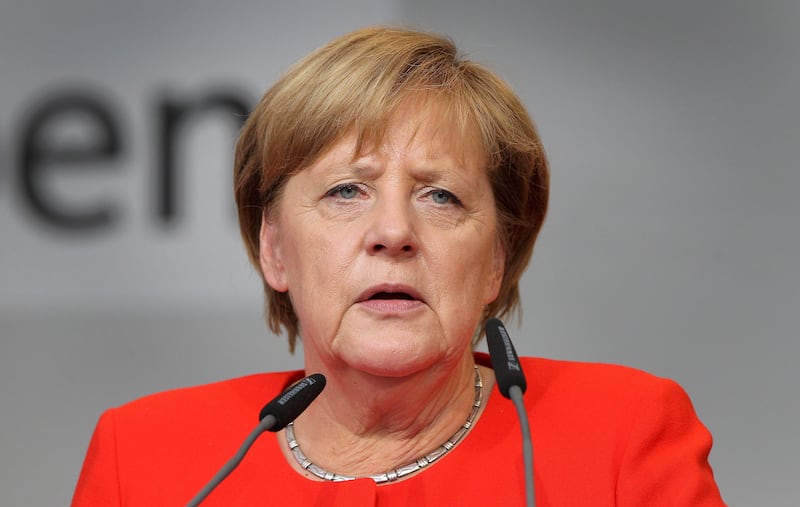Germany’s election campaign is taking a nasty turn as the rising tensions over immigration being felt across Europe seep into the campaign for power in the continent’s wealthiest country.
Bavaria’s prime minister and leader of the Christian Social Union (CSU), Horst Seehofer, told German newspaper Bild that he is concerned about the large numbers of migrants in the country, adding that he believes refugee family reunification is a “mistake”.
The CSU is the Bavarian sister party of chancellor Angela Merkel’s Christian Democrat Union (CDU), and polls suggest that the twin parties will comfortably claim victory over the centre-left Social Democrats (SPD) in the September 24 ballot.
However, the two leaders and their followers have frequently sparred over immigration. The CSU is also pushing for a cap on refugees to which the CDU will not agree. While they appeared to have put aside their differences for the sake of the election campaign, Mr Seehofer’s latest comments suggest the cracks are re-emerging.
_______________
Read more:
[ Will Merkel's low-key, serious style win her a fourth term as chancellor of Germany? ]
[ Merkel makes U-turn over Turkey EU membership in debate with election rival Schulz ]
[ Dreams of a new life start in Sicily as migrants risk all ]
_______________
In the interview, Mr Seehofer expressed concern that the influx of migrants into Germany would lead to “social tensions” in the years ahead, adding: “Preventing ghettos is one of the most important tasks. Bavaria is already acting accordingly.”
The Bavarian leader also insisted: “Family reunification for migrants, who can only stay temporarily in the country, is a mistake. Anyone who has brought his family to Germany will never return to his home country.”
Ms Merkel's controversial decision to throw open Germany's doors during the height of the refugee crisis in 2015 has come under fire, with critics seizing on terror attacks like at Berlin’s Christmas market last year as proof of the failure of her policy.
Mr Seehofer insisted that if there was another such influx of refugees, the nation would no longer welcome them.
“This is by no means possible,” he said. “The federal government will not do this either.”
European institutions and governments are still struggling to find solutions to migration, two years after the death of Syrian toddler Alan Kurdi highlighted the plight of refugees crossing the Mediterranean to reach Europe.
In a statement released on the anniversary of Kurdi’s body being found washed up on a Turkish beach, UNHCR, the UN Refugee Agency, urged the international community to take robust action to prevent more tragedies.
The Uzbeki family was also part of the huge wave of people fleeing to Europe from war-torn countries in 2015. Their story made headlines this week as it emerged that Bibihal Uzbeki, a 106-year-old Afghan woman believed to be the world’s oldest refugee, is facing deportation by Sweden after her asylum application was rejected.
Ms Uzbeki is totally bedbound and unable to see, speak or walk, having suffered a stroke when her application was rejected in June. Her son and grandson carried her on their backs to help her make the hazardous journey to Europe.
Her family are appealing for her to stay in Sweden to live out her final years, saying that she is physically unable to survive the trip back to Afghanistan.
"I don't understand, why?" Mohammad Uzbek, Bibikhal Uzbek's grandson, said to Al Jazeera.
"A hundred and six years old. She doesn't see, she doesn't speak, she doesn't walk. She's sick," he said. "I don't understand, why? Why turn her down?"
The Uzbeck case is just one example of the political and social crisis surrounding migration that remains at the heart of Europe.
Over a million migrants entered Germany in 2015 after Ms Merkel announced her open-door policy, and while the flow has stemmed more recently, it remains a heavily politicised issue.
Voters punished her CDU party last year in regional polls, and there is mounting evidence of the same anger and frustration among sections of Germany’s population as this month’s federal election draws nearer. Ms Merkel’s campaign rallies have been marred by violence and far-Right protests against immigrants.
During an election campaign on Tuesday in Heidelberg, hecklers threw tomatoes at the chancellor, shouting abuse like "hypocrite" and "traitor to the people" in what appeared to be a reference to her migration policies.
Police spokesman David Faulhaber said the situation was under investigation and the hunt was on to find out who threw the tomatoes, on suspicion of attempted bodily harm and attempted property damage.
The issue could yet derail Ms Merkel’s bid to win a fourth term in power. Her SDP challenger Martin Schulz used Sunday night’s televised debate to criticise her decision to welcome migrants in 2015 without support from other EU countries, calling it a “mistake”.
“I thought it was right that we said in this situation, ‘They can come,’” Schulz said. “But involving our European neighbours earlier would have been better.”
Merkel defended her actions. But she admitted that Germany should have paid more attention to improving conditions in countries such as Turkey and Lebanon which took in large amounts of migrants, as a way to prevent them from continuing on to Germany.
“That will never happen like that again,” she said.





